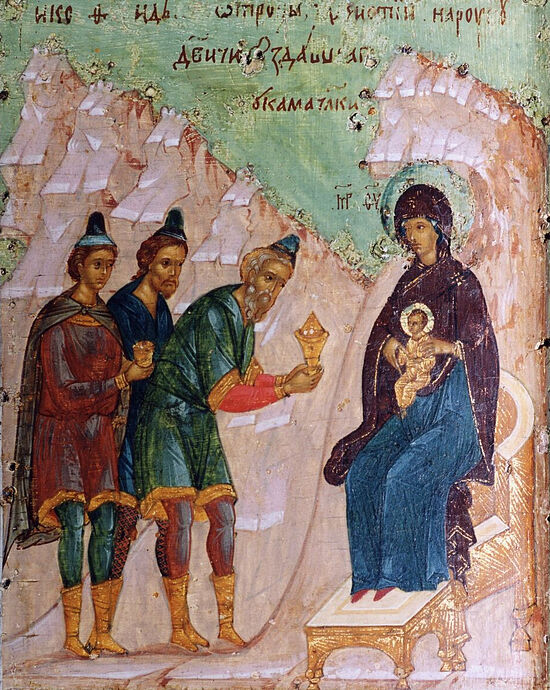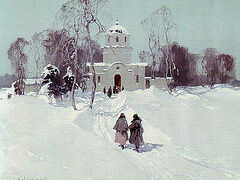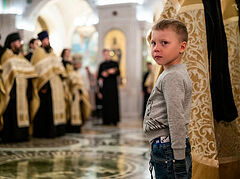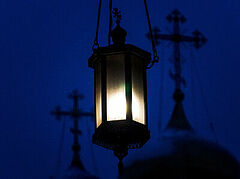 The Adoration of the Magi. Detail from an icon of the Laudation of the Mother of God (with Akathist). 16th c.
The Adoration of the Magi. Detail from an icon of the Laudation of the Mother of God (with Akathist). 16th c.
How did the Magi prepare for their trip? Now, at the beginning of the Nativity fast, is the best time to ask this question.
Of course, they did so scrupulously and in a timely manner. After all, no small distance lay ahead of them, and it was important for them to travel at a good pace, not falling behind the guiding star.
We also set out on the first day of the Nativity fast for our journey; and doesn’t our path lead us to the cave in Bethlehem?
This means that now is the optimal time to gather our thoughts, to think ahead as we set out on our journey, what we must bring with us, what we can’t do without on the way and without which we are not likely to reach our goal.
First of all, we will not reach our destination without a guide. It follows that we must put the Gospels in our backpack. And every day during our prayer rule we must read: one chapter, the daily Gospel reading, as much as we can but consistently, every day. Otherwise, how will we reach our destination if we don’t know the way?
Then we need, especially when we travel in winter, to light a fire in order to warm ourselves. This fire, which drives away ice and darkness, will be spiritual reading: Some will put What is the Spiritual Life, and How to be Attuned to It by St. Theophan the Recluse, in their backpacks, others will take Instructions by St. Paisius the Hagorite under their arms, yet others will grab the Letters of Igumen Nikon Vorubiev. Everyone will find a book according taste—the main thing is to stoke the fire in time, to keep up our zeal, fervency, and haleness of spirit.
We must definitely store up food—our prayer rule
We must definitely store up food—our prayer rule. And we must teach ourselves to perform it thoughtfully, with concentration, with the heart. Otherwise, how will we arrive if the soul gets weak from hunger?
How good it would be if we were to include in our consistent prayers texts that would gradually prepare us for the Nativity, and tune us to the feast. This could be fragments from the Akathist to the Nativity or extracts from the liturgical texts of the Forefeast for the Nativity (you can find them in the Menaion for December).
For example, texts such as these will help:
“Come let us worship the Divine Infant, and let us bring Him gifts: faith like gold, hymns like pleasant incense, and pure love like myrrh, to Him Who was pleased to be born in the flesh for our sakes.”
“O people, let us prepare for the feast of Christ’s Nativity, and raising our minds to Bethlehem, let us be raised up in thought, and we shall see the Virgin with the eyes of our souls, going to give birth in the cave to our God and Lord of all.”
“Now the time draws near for our salvation; prepare yourself O cave: the Virgin draws nigh to give birth. O Bethlehem, land of Judah, exalt and be glad, for from thee has our Lord shone forth. Hear O mountains and hills, and all the lands of Judea, for Christ Who created thee is coming to save thee, as He is the Lover of Mankind.”
You just repeat them and you feel happier, warmer in your soul; your hands grasp your staff more firmly, and the trees along the road blink by more quickly.
We’re not going just anywhere, we’re going to meet Christ—and the heart rejoices.
But what do we have with us? Only ourselves, or do we have Gifts to place in the Manger?
Do we hear the Church’s call?
Come let us worship the Divine Infant, and let us bring Him gifts: faith like gold, and hymns like pleasant incense, and pure love like myrrh, to Him Who was pleased to be born in the flesh for our sakes.”
Faith, incense, and myrrh.
Faith is more or less understood; with faith we set out on this path, and with faith we walk it.
Hymns like incense—yes, we gladly nod our heads, we have even chosen a prayer rule for the fast. And now, now when we are inspired by the thought that prayer during the course of the fast can become one of our gifts to Christ, we make every effort to have pure incense, unadulterated and fragrant.
What’s left is the myrrh—love. Of course, we’re not talking about sentimental sighs at the sight of a Christmas card. It’s all too serious for that. After all, we remember that myrrh is a burial oil—that same myrrh that the Myrrh-Bearers brought.
So, what is the connection between it and love?
Fr. Vsevolod Shpiller wrote:
“We, true Christians, should yearn to die with Christ, die to our sins, so that we might be resurrected with Him! Our love for Christ can be stronger than sin, stronger than death.”
Also coming to mind are the words of Metropolitan Anthony of Sourozh, perhaps shocking at first glance, but giving us wings if we think about it:
“The fathers say that if we were to remember that we can die in a moment—how we would run to do whatever good we can before then! If we were to think continually and tremblingly that the person standing next to us, to whom we can now do either good or evil, could die—how we would rush to take care of him! There would be no need, neither little nor great, that would surpass our ability to dedicate our lives to a person who is just about to die.”
If only we would remember that we could die in a moment, we would rush to do whatever good we can before then!
Further he tells us about his own personal experience, about his mother who was dying for three years:
“And when death entered into our life, it transformed life, in that every moment, every word, every action—because each of these could be the last—had to be a perfect expression of all love, all affection, all reverence that could be between us. And for three years, there were no trifles and no large things, but only trembling solemnity, reverent love, where everything mingles into the great; because love can be contained complete in one word, and in one movement we can express all love. And this is how it should be.”
After such words we sort of fall silent, and look back with confusion upon our own simple, narrow, and modest life.
This is very lofty. But perhaps it was best said in one story: “It’s easier to fly high than to fly low.”
We after all have entered on a path not to a toy manger under a fake Christmas tree, but to meet the Righteous Infant—the Living God. Maybe we should try to walk it in all seriousness?
If we make it our rule during the course (at least) of forty days of fasting to strive to be so reverent and affectionate, filled with awe and love toward our neighbor (at least), that the conclusion of this period will be a true transformation of soul.
And, when the journey is ended, on Christmas night, we will at last have something to place in the manger.
“Come, enter quickly,” said the Virgin once to the Magi, “and you shall behold the Invisible One, Who has appeared visibly and become a Child.” They entered with zeal, they worshipped Him, and brought Him gifts, fulfilling the divine prophecy.



